A highlight in the Spotlight Documentary programme of the 23rd Tribeca Festival, Kelly Anderson (Chair of the Department of Film and Media Studies at Hunter College, CUNY) and Jay Arthur Sterrenberg’s (co-founder of the Meerkat Media Collective) Emergent City reveals to us with balance and forethought the Sunset Park community efforts to reign in the developers of the waterfront property, now known as Industry City in Brooklyn, New York.
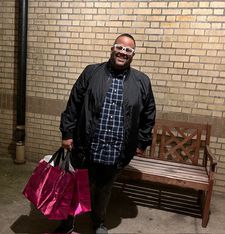 |
| Julio Peña III (now District Leader & New York State Committee member representing the 51st Assembly District and SCA member) is seen on the job in Emergent City Photo: Anne Katrin Titze |
As if emerging out of a pre-historic ocean, the industrial waterfront area of Sunset Park, Brooklyn receives star treatment in Emergent City. Being a great industry hub known as Bush Terminal from the early 20th century to being referenced by some as “the coolest place to be” in 2013, Brooklyn has gone through a long and storied history of change.
Industry City is New York’s largest privately owned industrial property and its story over the last decade turns out to be a perfect mirror to many of the developments going on around the US and worldwide. Rezoning, the process of democracy, community building and destruction, gentrification and green energy, city council work, endless town hall meetings, real estate speculation, luxury hotel threats, green jobs, small business interests, and Goldilockian compromises - Shakespearean in dimension, this deeply urban cautionary tale of a film (as was Kelly Anderson’s Rabble Rousers: Frances Goldin and the Fight for Cooper Square co-directed with Kathryn Barnier and Ryan Joseph in 2022) has it all.
From Sunset Park, Brooklyn, Kelly Anderson joined me on Zoom for an in-depth conversation on Emergent City.
Anne-Katrin Titze: Good to see you!
Kelly Anderson: You too!
AKT: Are you at Hunter or in Sunset Park?
KA: I’m in Sunset Park, working from home today.
AKT: First of all, congratulations on being in Tribeca!
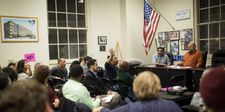 |
| Kelly Anderson on the activism in Sunset Park: “This community has been organising since the Nineties to keep this industrial waterfront industrial …” Photo: Jay Arthur Sterrenberg |
KA: Thank you. Yeah, I’m thrilled, it’s the perfect premiere for us. Because it’s New York, you know, it’s our hometown and it’s a great festival so we’re really really excited.
AKT: When we spoke about your film Rabble Rousers, I asked you about the title and I would like to begin with the title again. Emergent City is a wonderful title; it’s so optimistic. And there is almost a 1950s sheen to it as well. Tell me about the title!
KA: There’s a book called Emergent Strategy [Shaping Change, Changing Worlds] by Adrienne Maree Brown that meant a lot to us. It’s sort of about how you arrive at a final product or state of being through the making of it and the patterns. It’s about taking patterns from nature and looking at social change according to those patterns.
We were inspired by the book and then we didn’t know if the title would stick. We had many many titles, about six pages in a google doc but it stuck. I think what we like about it is that life goes on. I mean, as you saw at the end of the film, things are moving, people are leaving, other people are getting elected and life is going on. People are doing the best they can despite the obstacles and all the possibilities around them.
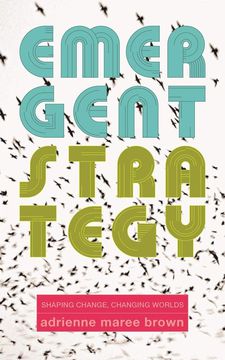 |
| Emergent Strategy: Shaping Change, Changing Worlds book by Adrienne Maree Brown |
I think we liked that the city is just constantly remaking itself over and over. Even with the reference to place names in the beginning of the film - we have New York as Lenapehoking and then the different names the city has had over time. It’s important to understand that it’s not that change can’t be made, but that it’s really the small actions of many many people over lots and lots of time that makes the city the place that it is. So I guess that’s what Emergent City meant to us.
And then we had that great signature image, that poster image where we put a camera in an aquarium and took that picture of the city skyline from the water off Sunset Park. It works so nicely with the title that we just haven’t been able to let it go.
AKT: The underwater start is great. It’s funny, because it also functions as a reminder that we all come from the sea, dinosaurs emerged, and here is Industry City! 2.4 million people live in Brooklyn, it would be the fourth largest city in the country. The film is very much about this place and (with the exception of this start) it focuses on the last ten years.
KA: The reason that the film starts in 2013 is that that’s when Jamestown Properties bought Industry City. Since the spine of the film is really that rezoning proposal and how the community deals with this proposed change, it made sense to follow it during that time. Fortunately my co-director Jay Arthur Sterrenberg had made a film [Public Money, 2018] previously about Participatory Budgeting with Carlos Menchaca in it as well in Sunset Park, so he had filmed material way back and that became part of the material for the film.
Combined with some archival material we were able to source here and there, we were able to give it that long, epic, decade-long feel, even tough we probably started working in earnest in 2017. It’s an important time period in New York. This community has been organising since the Nineties to keep this industrial waterfront industrial and try to figure out a way to use it to meet all the needs for construction and other manufacturing related to climate adaptation. We were really interested to find that out.
 |
| hifi provisions record store in Industry City Photo: Ed Bahlman |
We didn’t know when we started the film really. Looking at the whole waterfront and this looming threat of climate change and the loss of industrial waterfronts across New York, if you look at Williamsburg or even other cities, these industrial waterfronts become housing, or commercial development and so this community’s commitment to this waterfront I think is important to other places as well because you could just say, well, industry’s gone. Or you could say, a lot of industry has left, a little bit is hanging on, and we have this huge need to make stuff coming forward. And to use our waterways to move goods and products.
AKT: Full disclosure, I also am in Sunset Park and two of my neighbours are in your film.
KA: Oh my gosh, who are they?
AKT: Julio Peña [now District Leader & New York State Committee member representing the 51st Assembly District].
KA: I know Julio, yeah.
AKT: He lives upstairs in the same co-op, one of those famed Finnish co-ops.
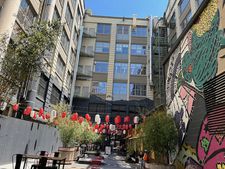 |
| Japan Village in Industry City Photo: Anne Katrin Titze |
KA: That’s wonderful, I didn’t realiee you were in Sunset Park! Who is the other?
AKT: Reva Goldberg, who is seen recording sound at one of the meetings. I believe she’s at the New York Times now.
KA: I’m sure now I’ll see you in the neighbourhood.
AKT: In the park or at the Greenmarket!
KA: Exactly!
AKT: Do you ever go to Industry City? Or is it a tainted place for you?
KA: No, I mean I go there sometimes. My feeling has always been that it’s out of step with the feeling of the community. It feels very different. That would be okay if it didn’t also have that impact of pushing up the rents and bringing a whole new demographic to the community who is working in Industry City now.
If it wasn’t having all this spillover effect, and we weren’t in danger of losing the industrial space, I think it would be okay. Who’s not going to like a record store [hifi provisions], St. Mark’s Comics or a skating rink [Dreamland Roller Rink] or a Salsa Wednesday [at Sahadi’s]?
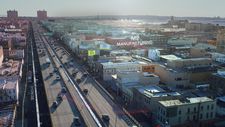 |
| Aerial view of Sunset Park’s waterfront with graphic overlay highlighting zoning Photo: Eric Phillips-Horst |
AKT: Or Japan Village or homemade Indian food at Taza.
KA: But that’s part of what we want people to do, is like we didn’t really want to tell people, Industry City is bad, if you go there you should feel bad, don’t go there. That’s not the point. The point is to maybe crack things open a little and think about things maybe they hadn’t thought about. Or maybe the film allows a conversation about something they were thinking about.
AKT: I think it will do that. Thank you, Kelly. Apropos, Pascal Bonitzer enjoyed the event at Hunter. I met with him the following day at The Met to have a look at some exhibitions there.
KA: Oh wonderful. I couldn’t make it that day but I’m so glad that it happened.
AKT: See you in the park!
KA: Yes, please say hi. Thank you, bye Anne-Katrin.
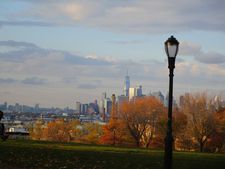 |
| Manhattan skyline from Sunset Park in the fall Photo: Anne Katrin Titze |
Coming up - Kelly Anderson on green re-industrialisation, Uprose and the fight for the industrial waterfront, the filmmakers’ relationship with former Councilmember Carlos Menchaca and Andrew Kimball, former CEO of Industry City, the thrill of community board meetings and balancing development with the neighbourhood residents’ desires.
After the World Premiere of Emergent City on Tuesday, June 11 at 8:30pm, filmmakers Kelly Anderson and Jay Arthur Sterrenberg, plus Carlos Menchaca (former Councilmember, District 38), Marcela Mitaynes (Assemblymember, 51st District of New York), and Elizabeth Yeampierre (Executive Director, UPROSE) will participate in a Q&A - Village East by Angelika. Additional screenings will take place on Wednesday, June 12 at 8:45pm and Thursday, June 13 at 3:15pm - Village East by Angelika.






















